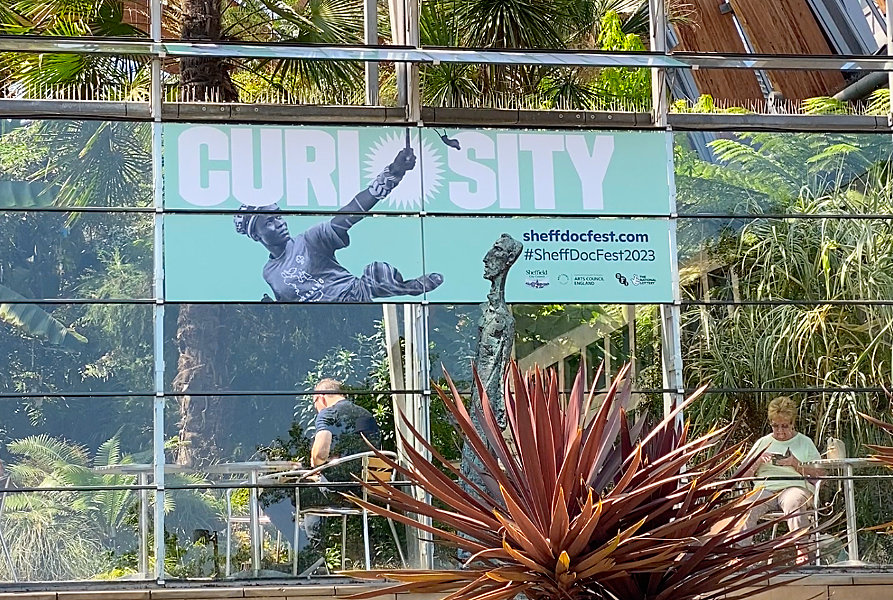A report from Sheffield DocFest
Has climate, environment and the collapse of global ecosystems dropped off the agenda? To judge from the programme at this year’s SheffieldDocFest you could be forgiven for thinking so. Of some 120 documentary films screened not one could be considered ‘environmental’. Well, not quite true. ‘Between the Rains’, a Kenyan production, referenced the harsh drought impacting much of the country in its hard hitting, rites of passage, story about growing up in a traditional rural Turkana village. Village elders observed that their collective despoiling of nature was a primary cause of inter-tribal conflict.
So what does hit the headlines now? According to Channel 5’s commissioning editor Denise Seneviratne it’s all about ’blue lights and red blood’, crime and casualty dramas. Broadcast channels measure their success in audience numbers, streaming channels by subscriptions. Any films they commission must help them hit their targets. And, sorry to say, environmental collapse and climate change don’t do that. Advice to aspiring film makers? Your pitch has to sit next to Lord of the Rings and J.Lo in audience appeal.
One channel you might expect to lead the way is National Geographic. But their strategy is to expand into areas such as history and science. Flagships programmes in the pipeline include following the development of an anti-cancer vaccine and NASA’s Artemis ‘Return to the Moon’ mission. Climate and environment have become a ‘by the way’ of expeditionary documentaries such as ‘On the Edge with Alex Honnold’, one of the world’s most adventurous free climbers, as he tackled a 4,000’ cliff rising our of the sea in Greenland. The producers tagged along a climate scientist to take measurements. But the film, with some remarkable photography, is about Alex and the climb, not so much the loss of ice caps and glaciers and how the ensuing – and now irreversible – sea level rise will inundate coastlines around the world.
Channel 5 has released ‘Endurance: Race to the Pole’ which sees adventurer Ben Fogle head to Antarctica to re-live the expeditions of Scott, Shackleton and Amundsen. It’s sold as a ‘period drama’ and an epic adventure.
Nature and climate is not even a niche against a relentless pushing of the envelope in revelatory coverage of sex, surgery and social struggles.
There are, of course, channels which showcase nature at its finest. Wildlife documentaries have become an art form in their own right. But in case you thought they were produced to celebrate nature, here’s how Sky pitches theirs: “Sky Nature provides a natural space for advertisers to align their brand with new and exciting programming to a highly-engaged audience.”
Yup, it’s all about advertising, not saving the planet. Well, these things are costly to produce. Someone has to raise the funds, somehow. The Attenborough style genre has raised the stakes so far that you might argue it’s run its course. Surely there is only so much extraordinary beauty to be found and filmed. If this hasn’t triggered a collective social conscience, then no wonder film makers are reverting more simply to documenting its disappearance.
One of the few promoters of climate crisis stories is The Guardian, which – did you even know? – features short documentaries on their website and on YouTube.
Back at the DocFest, in its 30th year one of the film world’s biggest and most important events, the list of films and film makers spans scores of countries, embracing (mostly) heart-wrenching topics such as neurodiversity, conflict, warfare, struggle and loss. Films from Iran, Russia, China, Brazil and Afghanistan competed for attention. Watching these things, let alone making them, can be a tough call.
And the winner was . . . In the Rearview from Ukraine, which follows a minibus evacuating people through “a vast landscape of natural beauty littered with the carnage of war, and the desolation and destruction of once populated communities”.
The Sheffield DocFest provides an important platform for stories and storytellers who need to be heard and seen. However painful, it’s a stark reflection of the messy state of our world. This is, in discomfiting reality, the environment in which we’re living.
